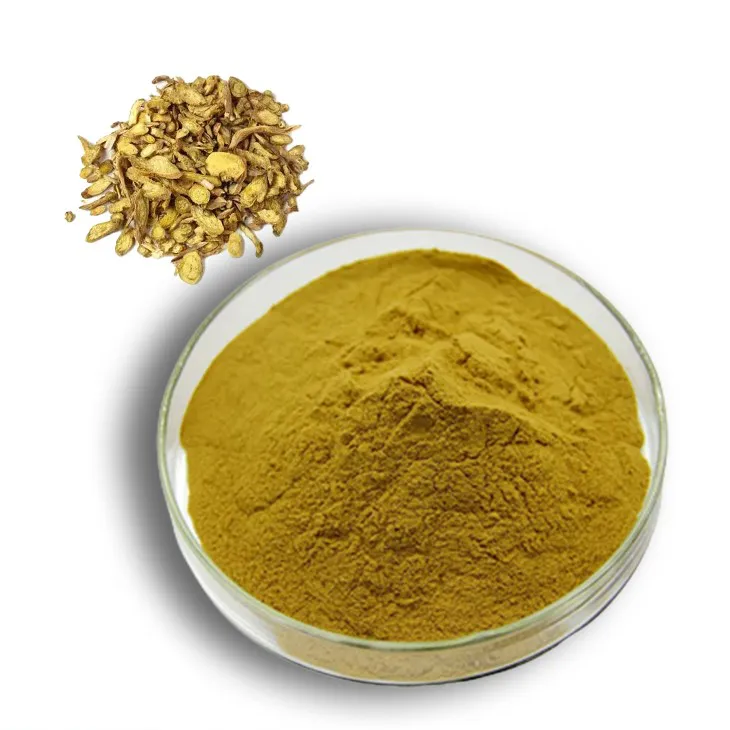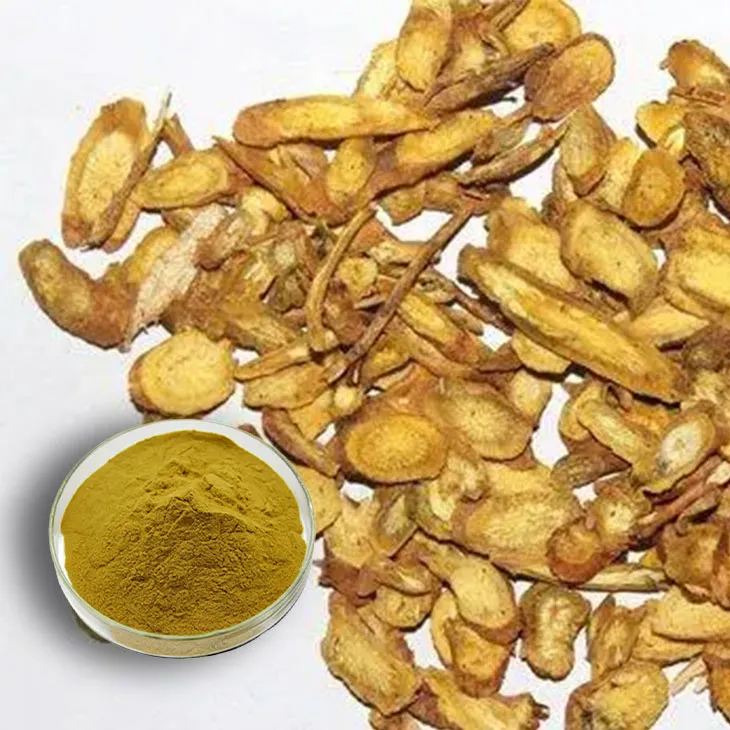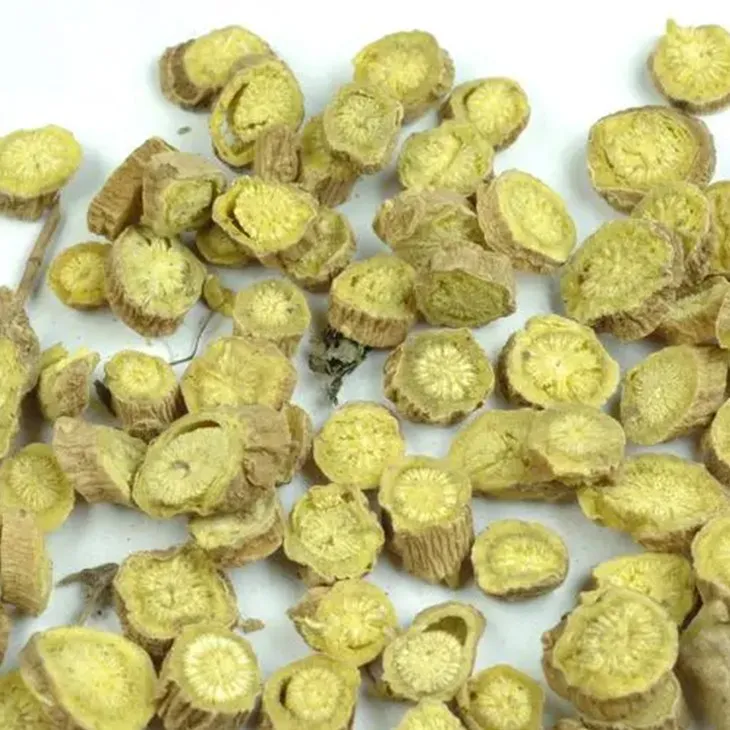- 0086-571-85302990
- sales@greenskybio.com
14 Major Health - care Effects of Baicalin.
2024-11-12

1. Anti - microbial Effects
Baicalin has shown remarkable anti - microbial properties. It is effective against a wide range of bacteria, including both gram - positive and gram - negative bacteria. Gram - positive bacteria such as Staphylococcus aureus, which can cause various infections from skin infections to more severe systemic infections, are inhibited by Baicalin. The compound interferes with the bacterial cell wall synthesis or disrupts the normal functioning of the bacterial cell membrane, thereby preventing the bacteria from multiplying and causing harm.
Moreover, Baicalin also exhibits activity against fungi. Fungal infections can be difficult to treat, especially in immunocompromised individuals. Baicalin has the potential to be a natural alternative or adjunct to traditional antifungal medications. It can target the fungal cell membrane, affecting its integrity and function, which is crucial for the survival of the fungus. This anti - microbial effect of baicalin makes it a valuable compound in the fight against infectious diseases.

2. Anti - allergic Effects
Allergies are a common health issue that can range from mild discomfort to life - threatening reactions. Baicalin has been found to have anti - allergic effects. It can modulate the immune system's response to allergens. When an allergen enters the body, the immune system may overreact, releasing histamine and other inflammatory mediators. Baicalin can inhibit the release of these mediators, reducing the symptoms associated with allergies such as sneezing, itching, and swelling.
Furthermore, baicalin can also affect the activity of immune cells involved in the allergic response. For example, it can regulate the function of mast cells, which are key players in the early stages of an allergic reaction. By suppressing the activation of mast cells, baicalin can prevent the cascade of events that lead to allergic symptoms, providing relief for allergy sufferers.

3. Hepatoprotective Effects
The liver is a vital organ responsible for many essential functions in the body, including detoxification. Baicalin has hepatoprotective effects, meaning it can protect the liver from damage. It can counteract the effects of toxins, drugs, and other harmful substances that can cause liver injury.
One way baicalin protects the liver is by reducing oxidative stress. The liver is constantly exposed to reactive oxygen species (ROS) generated during normal metabolic processes. Excessive ROS can damage liver cells. Baicalin has antioxidant properties that can scavenge these free radicals, preventing oxidative damage to the liver cells. Additionally, baicalin can also modulate liver enzyme levels. Elevated levels of certain liver enzymes are often an indication of liver damage. By normalizing these enzyme levels, baicalin can help maintain liver health.

4. Anti - inflammatory Effects
Inflammation is a natural response of the body to injury or infection, but chronic inflammation can lead to various diseases. Baicalin has potent anti - inflammatory properties. It can inhibit the production of inflammatory cytokines, which are signaling molecules that promote inflammation. By reducing the levels of these cytokines, baicalin can dampen the inflammatory response.
Baicalin also targets the pathways involved in the activation of inflammatory cells such as macrophages. Macrophages play a crucial role in the inflammatory process by releasing inflammatory mediators. Baicalin can prevent the activation of macrophages or reduce their ability to secrete these mediators, thereby reducing inflammation at the cellular level. This anti - inflammatory effect of baicalin makes it a potential treatment option for inflammatory diseases such as arthritis, inflammatory bowel disease, etc.

5. Anti - cancer Potential
Recent research has suggested that baicalin may have anti - cancer potential. It can interfere with the growth and proliferation of cancer cells. One mechanism by which it does this is by inducing cell cycle arrest in cancer cells. Cancer cells divide uncontrollably, and by halting their cell cycle, baicalin can prevent their further growth.
Baicalin can also promote apoptosis, or programmed cell death, in cancer cells. Normal cells have a built - in mechanism to self - destruct when they are damaged or abnormal. However, cancer cells often evade this process. Baicalin can re - activate this apoptotic pathway in cancer cells, leading to their death. Additionally, it may also have anti - angiogenic effects, which means it can prevent the formation of new blood vessels that are necessary for tumor growth and metastasis.
6. Neuroprotective Effects
The nervous system is highly vulnerable to damage from various factors such as oxidative stress, inflammation, and neurodegenerative diseases. Baicalin has shown neuroprotective effects. It can protect neurons from oxidative damage by acting as an antioxidant. Neurons are rich in lipids, which are particularly susceptible to oxidative damage. Baicalin can scavenge free radicals and protect the integrity of neuronal membranes.
Moreover, baicalin can also have an impact on neurotransmitter systems. It can modulate the levels of neurotransmitters such as dopamine, serotonin, etc. Abnormalities in neurotransmitter levels are associated with various neurological and psychiatric disorders. By regulating these levels, baicalin may have a beneficial effect on brain function and mental health. In addition, it may also play a role in protecting the nervous system from neurodegenerative diseases such as Alzheimer's and Parkinson's disease.
7. Cardioprotective Effects
The heart is a crucial organ, and protecting it from damage is essential for overall health. Baicalin has cardioprotective effects. It can reduce the risk of heart disease by several mechanisms. One of the ways is by reducing blood lipid levels. High levels of cholesterol and triglycerides in the blood are risk factors for heart disease. Baicalin can lower these lipid levels, thereby reducing the burden on the heart.
Baicalin can also improve endothelial function. The endothelium is the inner lining of blood vessels, and its proper function is crucial for maintaining normal blood flow and preventing cardiovascular diseases. By enhancing endothelial function, baicalin can help prevent the development of atherosclerosis, which is a major cause of heart attacks and strokes. Additionally, it can also have anti - arrhythmic effects, which means it can help regulate the heart's rhythm and prevent abnormal heartbeats.
8. Anti - diabetic Effects
Diabetes is a global health epidemic, and finding effective treatments is of great importance. Baicalin has shown potential in the management of diabetes. It can improve insulin sensitivity. Insulin is a hormone that regulates blood sugar levels. In diabetes, the body's cells become resistant to insulin, leading to high blood sugar levels. Baicalin can enhance the cells' ability to respond to insulin, thereby helping to lower blood sugar levels.
Baicalin can also affect glucose metabolism in the liver. The liver plays a key role in glucose production and storage. In diabetes, the liver may produce too much glucose. Baicalin can regulate the liver's glucose - producing enzymes, reducing the amount of glucose released into the bloodstream. Moreover, it may also have a role in protecting pancreatic beta cells, which are responsible for producing insulin. By protecting these cells, baicalin can help maintain normal insulin production.
9. Anti - viral Effects
Viruses are a major cause of infectious diseases, and the search for effective antiviral agents is ongoing. Baicalin has demonstrated antiviral activity against several viruses. For example, it has shown potential against influenza viruses. Influenza is a highly contagious viral disease that can cause severe illness. Baicalin can interfere with the replication cycle of the influenza virus, preventing it from multiplying and spreading.
Baicalin may also have activity against other viruses such as herpes viruses. Herpes viruses can cause recurrent infections, and current treatments are not always completely effective. Baicalin can target different stages of the herpes virus life cycle, from virus entry into the host cell to the production of new virus particles. This antiviral effect of baicalin makes it a promising candidate for the development of new antiviral drugs.
10. Anti - oxidative Effects
Oxidative stress is implicated in many diseases and the aging process. Baicalin is a powerful antioxidant. It can scavenge a variety of free radicals, including superoxide anions, hydroxyl radicals, etc. These free radicals are highly reactive molecules that can damage cells, proteins, and DNA.
By neutralizing these free radicals, baicalin can protect cells from oxidative damage. It can also enhance the body's antioxidant defense system. The body has its own endogenous antioxidant enzymes such as superoxide dismutase (SOD) and glutathione peroxidase (GSH - Px). Baicalin can upregulate the activity of these enzymes, further strengthening the body's ability to combat oxidative stress. This anti - oxidative effect of baicalin is beneficial for maintaining overall health and preventing various diseases associated with oxidative damage.
11. Anti - aging Effects
As mentioned earlier, baicalin has anti - oxidative effects, which are closely related to its anti - aging properties. Oxidative damage to cells is one of the main causes of aging. By scavenging free radicals and reducing oxidative stress, baicalin can slow down the aging process at the cellular level.
Baicalin can also affect the function of telomeres. Telomeres are the protective caps at the ends of chromosomes. As cells divide, telomeres shorten, and when they become too short, cells enter a state of senescence or die. Baicalin may be able to protect telomeres from shortening, thereby maintaining the longevity of cells. Additionally, it can also improve the function of mitochondria, which are the powerhouses of the cell. Mitochondrial dysfunction is associated with aging, and by enhancing mitochondrial function, baicalin can contribute to anti - aging effects.
12. Immunomodulatory Effects
Baicalin can modulate the immune system in various ways. It can enhance the immune response when the body is facing an infection. For example, it can increase the activity of immune cells such as lymphocytes and macrophages, which are important for fighting off pathogens.
On the other hand, baicalin can also prevent the immune system from overreacting. In autoimmune diseases, the immune system mistakenly attacks the body's own tissues. Baicalin can regulate the immune system to prevent this over - activation, potentially providing a treatment option for autoimmune diseases. This immunomodulatory effect of baicalin makes it a valuable compound for maintaining immune balance in the body.
13. Renoprotective Effects
The kidneys play a crucial role in filtering waste products from the blood and maintaining fluid and electrolyte balance. Baicalin has renoprotective effects, which means it can protect the kidneys from damage.
It can reduce oxidative stress in the kidneys, similar to its effect on other organs. High levels of oxidative stress in the kidneys can lead to kidney cell damage and dysfunction. Baicalin can also regulate blood pressure in the kidneys. High blood pressure is a major risk factor for kidney disease. By maintaining normal blood pressure in the kidneys, baicalin can help protect the renal tissue. Additionally, it may also have a role in preventing the formation of kidney stones by affecting the levels of substances involved in stone formation.
14. Gastroprotective Effects
The gastrointestinal tract is constantly exposed to various substances, including food, drugs, and toxins. Baicalin has gastroprotective effects. It can protect the stomach and intestines from damage caused by these substances.
Baicalin can increase the production of mucus in the gastrointestinal tract. Mucus forms a protective layer that shields the mucosal lining from harmful substances. It can also reduce the production of gastric acid, which can be corrosive to the stomach lining if produced in excess. Additionally, baicalin can modulate the inflammatory response in the gastrointestinal tract, preventing or reducing inflammation that can lead to gastrointestinal disorders such as gastritis and ulcerative colitis.
FAQ:
What is baicalin?
Baicalin is a flavonoid compound. It is derived from plants such as Scutellaria baicalensis Georgi. It has shown a variety of biological activities and is being studied for its potential health benefits.
How does baicalin show anti - microbial effects?
Baicalin can interfere with the growth and reproduction of microorganisms. It may act on the cell membranes or intracellular components of bacteria, fungi or viruses, disrupting their normal physiological functions. For example, it can inhibit the synthesis of bacterial cell walls or interfere with viral replication processes.
What are the mechanisms behind its anti - allergic effects?
Baicalin can regulate the immune system in the context of allergies. It may suppress the activation and proliferation of immune cells such as mast cells and eosinophils that are involved in allergic reactions. It can also modulate the release of inflammatory mediators like histamine, thereby reducing allergic symptoms.
How does baicalin protect the liver?
Baicalin has hepatoprotective effects through multiple mechanisms. It can reduce oxidative stress in the liver by scavenging free radicals. It also may regulate the metabolism of lipids and other substances in the liver, and protect liver cells from damage caused by toxins or drugs.
Can baicalin be used as a dietary supplement?
While baicalin has potential health benefits, its use as a dietary supplement should be approached with caution. In some regions, it may be available in supplement form. However, more research is needed to determine the optimal dosage, potential side effects, and long - term safety. Also, regulatory requirements for dietary supplements vary in different countries.
Related literature
- Baicalin: A Review of Its Phytochemistry, Pharmacology, and Pharmacokinetics"
- "The Antioxidant and Hepatoprotective Effects of Baicalin: A Comprehensive Review"
- "Baicalin in Anti - microbial Therapy: Current Knowledge and Future Perspectives"
- ▶ Hesperidin
- ▶ Citrus Bioflavonoids
- ▶ Plant Extract
- ▶ lycopene
- ▶ Diosmin
- ▶ Grape seed extract
- ▶ Sea buckthorn Juice Powder
- ▶ Fruit Juice Powder
- ▶ Hops Extract
- ▶ Artichoke Extract
- ▶ Mushroom extract
- ▶ Astaxanthin
- ▶ Green Tea Extract
- ▶ Curcumin
- ▶ Horse Chestnut Extract
- ▶ Other Product
- ▶ Boswellia Serrata Extract
- ▶ Resveratrol
- ▶ Marigold Extract
- ▶ Grape Leaf Extract
- ▶ New Product
- ▶ Aminolevulinic acid
- ▶ Cranberry Extract
- ▶ Red Yeast Rice
- ▶ Red Wine Extract
-
Sea buckthorn oil
2024-11-12
-
Tongkat Ali Extract Powder
2024-11-12
-
White mustard seed extract
2024-11-12
-
Dandelion Root Extract
2024-11-12
-
Beetroot juice Powder
2024-11-12
-
Hesperidin
2024-11-12
-
Maitake Mushroom Extract
2024-11-12
-
Almond Extract Powder
2024-11-12
-
Passionflower Extract
2024-11-12
-
Mulberry Extract
2024-11-12





















